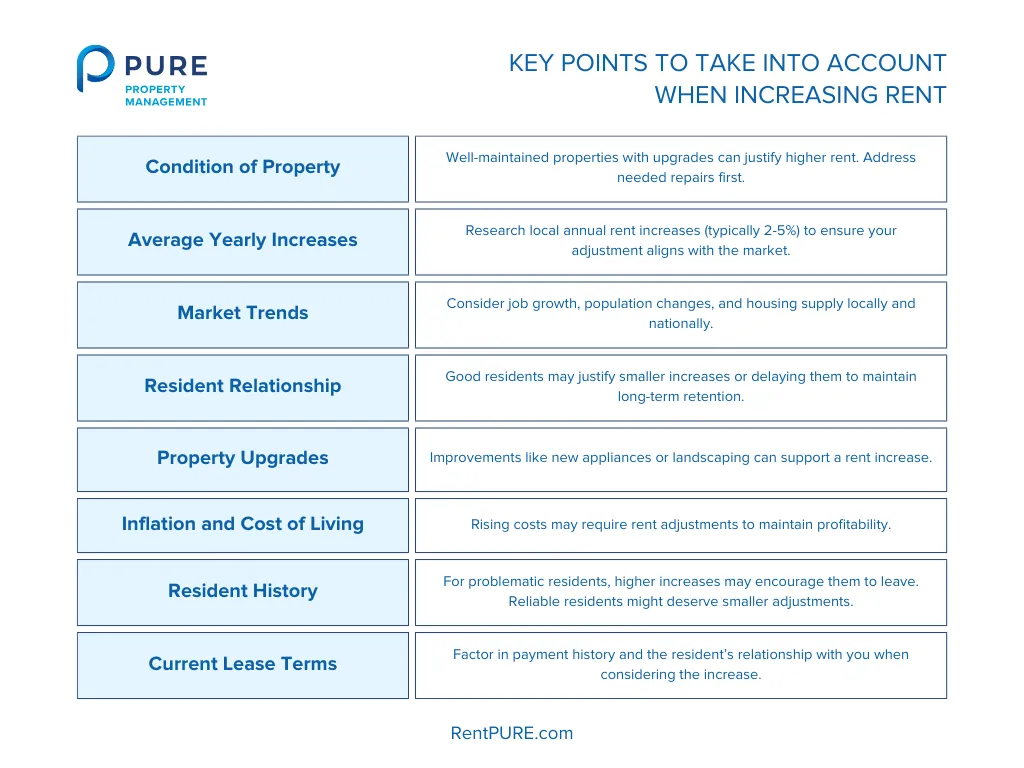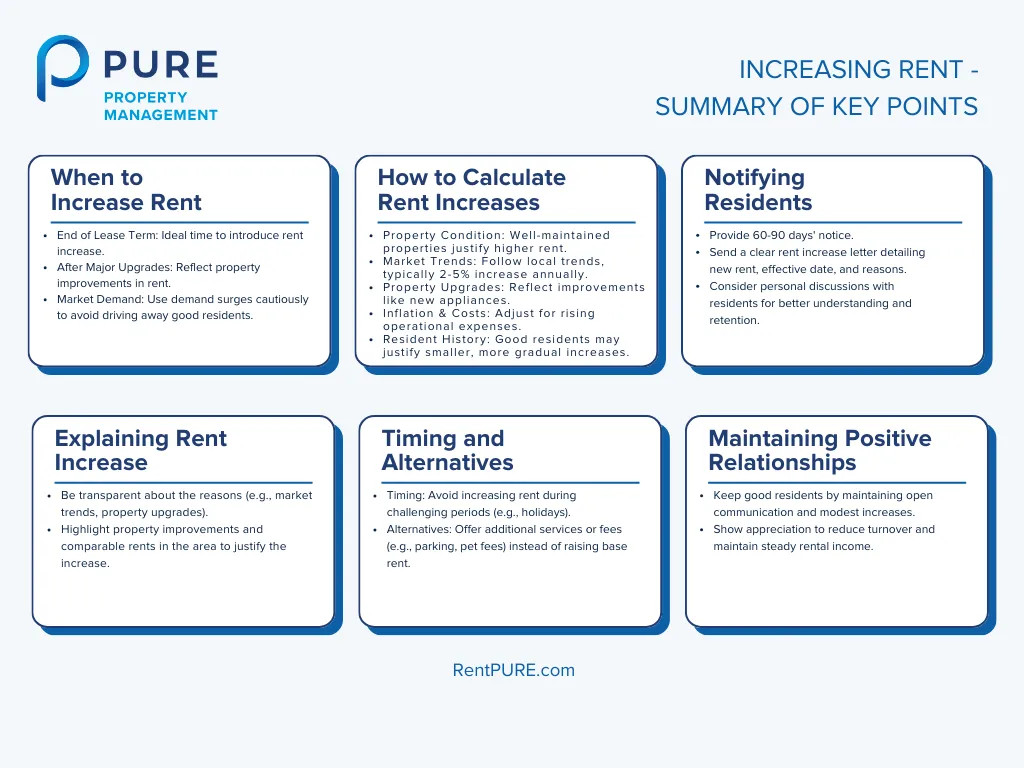Raising rent on your rental property is often necessary to cover rising expenses, property upgrades, or shifts in the market. But doing it right means balancing your financial goals with maintaining positive resident relationships. This guide will help you navigate how to increase rent effectively, minimizing resident turnover and maximizing your property’s profitability.
Managing rent adjustments can be complex, whether you’re handling it on your own or aiming to optimize your investment returns. We’ll cover practical strategies to ensure your rent increases are fair, justified, and well-received by residents, keeping your rental income steady and your property competitive.
Key Takeaways:
- Determine Reasonable Rent Increases: To set a fair rent increase, consider your property’s value, recent upgrades, and market conditions. Align the increase with local trends and ensure it’s justified by the property’s current offerings and condition.
- Timing Is Crucial: Raise rent at appropriate times, such as the end of a lease or after significant property upgrades. Avoid sudden increases during financially challenging periods, like the winter months or holidays, to minimize resident disruptions.
- Calculating Rent Adjustments: Use a consistent method, like a percentage increase or rent calculators, to determine new rates. Take into account factors like property improvements, inflation, and local market rates to ensure the increase is both fair and profitable.
- Communicate Clearly and Early: Notify residents well in advance, clearly stating the new rent, the effective date, and the reasons behind the increase. Consider face-to-face discussions to maintain a positive relationship and address any concerns they might have.
- Maintain Positive Resident Relationships: Retaining good residents is often more beneficial than maximizing rent. Regular, modest increases and clear communication help keep residents satisfied and reduce turnover, saving you time and money in the long run.
For a more comprehensive look at maximizing rental income, check out our guide on maximizing rental income. This post specifically focuses on rent increases as one of the many ways to boost your property’s profitability.
Here’s a comprehensive guide to help you navigate the process of raising rent effectively and fairly.
When to Increase Rent
Knowing when to increase rent is as important as deciding by how much. Timing your increase can help avoid friction with residents and ensure the change feels justified.
- End of Lease Term: This is the ideal time to introduce a rent increase. It allows residents to decide if they want to renew at the new rate or move on. Be sure to provide ample notice, typically 60 to 90 days, so they have time to consider their options. It is usually best to increase annually.
- After Major Property Upgrades: If you’ve invested in substantial upgrades like new flooring, appliances, or additional amenities, a rent increase can reflect the improved property value. Make sure to communicate these improvements clearly to residents so they understand the reasons behind the increase. Be cautious issuing an increase that may seem like it is in response to a resident’s request for maintenance. Know the difference between routine maintenance and property improvements.
- Sudden Increases in Demand: If your area is experiencing a surge in rental demand due to factors like population growth or new businesses, it might be the right time to raise rent. However, always weigh this against resident retention, especially if you have reliable, long-term residents. A sudden, significant increase may cause good residents to leave, leading to vacancies that could take months to fill.
Calculating Rent Increase
Determining how much to increase rent can be challenging. You want to ensure your property remains profitable while also retaining good residents. Calculating a rent increase requires considering multiple factors to ensure it’s both fair and profitable.
What to Take into Account When Calculating Increases
- Condition of Property: A well-maintained property with recent renovations can command higher rent. If your property needs repairs, consider addressing these issues before increasing rent. The condition of the property directly affects how residents perceive its value, so ensure it’s in good shape before making any changes.
- Average Yearly Rent Increases in Your Market: Research the typical annual rent increases in your area. A common range is 2-5%, but this can vary based on market conditions. Knowing the average increase in your area provides a benchmark to ensure your rent adjustments are in line with local standards.
- National and Local Market Trends: Keep an eye on both national and local market trends with publications like CBRE and Zillow Research. Factors such as job growth, population changes, and housing supply can influence rental rates. If the rental market is strong, a higher increase may be justified. However, if the market is slowing down or there is an abundance of rental properties, you may need to be more conservative with your increase.
- Qualitative Factors: Consider your relationship with your residents and their history. Good residents who pay on time and take care of the property are valuable. A smaller increase, or even holding off on an increase, may be worth it to keep them. Weigh the long-term benefits of maintaining a good resident relationship versus the short-term gain of a higher rent.
- Property Improvements and Upgrades: If you’ve recently upgraded the property, such as adding new appliances or improving landscaping, factor these into your calculation. Highlight these improvements when communicating the increase to residents.
- Inflation and Cost of Living Increases: As the cost of living rises, your operational costs may increase too. Adjusting rent to keep pace with inflation ensures you don’t lose profitability over time. Ensure residents understand that the increase is not arbitrary but a reflection of increased costs that are out of your control.
- Current Lease Terms and Resident History: Evaluate the resident’s payment history and your past interactions. If a resident has been problematic, a higher increase might encourage them to leave, freeing the unit for a potentially more reliable resident. However, for reliable long-term residents, consider smaller, incremental increases to maintain a positive relationship.
How To Calculate Rent Increases
- Simple Percentage Increase Formula: A straightforward method is to apply a percentage increase to the current rent. For instance, a 4% increase on $1,200 rent would add $48, making the new rent $1,248. This formula is simple and easy to communicate to residents, but ensure the percentage is reasonable based on your research.
- Using a Rent Increase Calculator: Online calculators can help factor in variables like property value, local market rates, and inflation. There are plenty of tools out there that can help you do that, so it’s important to do your research and consider which one works best for you. Use these tools as a guideline and combine them with your knowledge of the property’s unique aspects and resident relationships.
- Research Similar Properties: Consider doing some research on your own and looking at what similar properties are renting for in your area. That will gve you a good idea of what a fair rent increase would be.

Notifying Residents of a Rent Increase
Communicating a rent increase to residents requires clarity, professionalism, and a respectful approach. Here’s how to do it right.
Legal Requirements and Notice Periods (State-Specific)
Before notifying your residents, it’s crucial to understand the legal requirements in your state. Each state has different laws regarding the notice period for rent increases. Generally, the notice period ranges from 30 to 90 days, depending on the state and the duration of the lease. For example:
- California: 30 days’ notice for increases of 10% or less, and 90 days for increases over 10%.
- Texas: No specific notice period is required for month-to-month leases, but 30 days is recommended.
- Florida: Typically requires a 15-day notice for month-to-month leases.
Please keep in mind that this is true at the time of writing and may change in the future. Always check your state’s landlord-resident laws or consult a legal professional to ensure compliance.
Writing a Clear and Professional Rent Increase Letter
A well-crafted rent increase letter is key to maintaining a good relationship with your residents. The letter should be clear, concise, and professional. Here’s what to include:
- Introduction: Start by addressing the resident by name and stating the purpose of the letter.
- Details of the Increase: Clearly specify the new rent amount, the old rent amount, and the effective date of the change.
- Reason for the Increase: Briefly explain the reason for the increase, such as property improvements, market adjustments, or increased costs.
- Notice Period: Reiterate the notice period and ensure it aligns with state regulations.
- Offer for Communication: Invite the resident to contact you if they have any questions or concerns.
Consider Talking to Residents Directly
While a formal letter or email is standard practice, taking the time to discuss rent increases over the phone with your residents can have a significant impact. Having a 1-on-1 conversation shows that you care about their situation and are willing to address any concerns they may have. This personal approach can help cushion the blow and make the resident feel valued and respected.
Relying solely on written communication can seem impersonal, and residents may react negatively without the opportunity to discuss their concerns. High resident turnover can lead to vacancies, costing you 1-2 months’ rent in lost income, plus the added expense of marketing and preparing the unit for new residents.
Spending a few minutes to meet with your resident and explain the reasons behind the increase can be worth thousands of dollars in saved costs and a more stable rental income.
Providing Ample Time for Residents to Adjust
It’s respectful and often legally required to provide residents with sufficient notice before the increase takes effect. This should be at least 60-90 days before their lease expires.
This allows them to budget accordingly or make decisions about renewing their lease. In addition to meeting the legal notice requirements, consider providing additional time as a gesture of goodwill, especially if the increase is significant. If additional time is granted or other modifications to the legal notice are made, make sure to mutually agree to everything in writing.
This approach can foster goodwill and reduce the likelihood of resident turnover, ultimately saving you the cost and effort of finding new residents.
How to Explain Rent Increase to Residents
Being transparent about the reasons behind a rent increase can help maintain a positive relationship with your residents. Here’s how to notify the resident of a rent increase and approach the conversation effectively:
-
Communicating the Reasons Behind the Increase: When discussing the rent increase, be honest and straightforward. Explain why the increase is necessary, whether it’s due to rising maintenance costs, property upgrades, or adjustments to align with market rates.
This transparency helps residents understand that the increase is not arbitrary. Sharing your reasons helps them see the broader context and can make the increase more acceptable.
-
Highlighting Property Improvements and Value: If you’ve made significant upgrades, such as new appliances, landscaping, or security enhancements, emphasize these improvements.
Highlighting the added value they bring to the property helps residents see the benefits they are receiving for the increased rent. Use specific examples to illustrate how these changes improve their living experience and justify the increase.
-
Emphasizing Fair Market Value and Comparable Rents: Show residents that your rent increase is in line with similar properties in the area. Provide data on local rental rates and explain how your property’s amenities and condition justify the new rent.
This approach helps residents feel the increase is fair and reasonable. Comparisons with other properties can also help residents see that their rent is still competitive within the local market.
Additional Considerations
When deciding on rent increases, it’s important to think beyond the numbers. Here are some additional factors to keep in mind:
Timing is Key
Choosing the right time to increase rent on your rental property can make a big difference in resident reactions. Consider factors like the time of year—raising rent during the winter or holidays can be more challenging for residents. Instead, aim for times when residents are more likely to be financially stable, such as spring or early summer. It is also important to consider timing if the resident decides to move on and you have a vacancy to fill.
This can help ensure a smoother transition and minimize the risk of residents deciding to move out.
Alternatives to Rent Increases
If a rent increase isn’t the right move, consider other ways to increase revenue or offset costs:
- Lease Renewals: Offer lease renewal incentives, such as reduced rent for signing a longer-term lease. This can provide you with stability while also giving residents a reason to stay.
- Additional Fees: Consider adding fees for additional services like parking, storage, or pet fees, instead of increasing the base rent. These fees can help offset rising costs without directly affecting the base rent, making it easier for residents to manage.
The Importance of Maintaining Positive Resident Relationships
Ultimately, maintaining a good relationship with your residents should be a priority. Happy residents are more likely to accept rent increases and less likely to move out. Communicate openly, be willing to negotiate, and show appreciation for their tenancy. This not only helps reduce turnover but also contributes to a positive reputation for your property. A positive landlord-resident relationship can lead to improved resident retention and stable rental income.
In Conclusion
Raising rent is an essential part of property management, but it requires a careful balance between maintaining profitability and keeping good residents. Here are some key takeaways:

Doing all of this is not easy, especially at scale. Professional property managers come with a lot of benefits, making the process seamless and stress-free. Contact us today to see how we can help maximize your rental income while keeping your residents satisfied.
Here are some helpful resources that can help you further increase your rental income and optimize your business:








